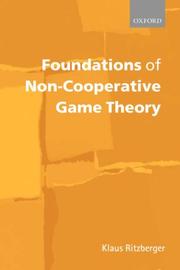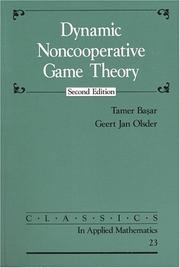| Listing 1 - 10 of 19 | << page >> |
Sort by
|

ISBN: 0199247862 9780199247868 Year: 2002 Publisher: Oxford: Oxford university press,
Abstract | Keywords | Export | Availability | Bookmark
 Loading...
Loading...Choose an application
- Reference Manager
- EndNote
- RefWorks (Direct export to RefWorks)

ISBN: 089871429X 9780898714296 Year: 1999 Volume: 23 Publisher: Philadelphia: Society for industrial and applied mathematics,
Abstract | Keywords | Export | Availability | Bookmark
 Loading...
Loading...Choose an application
- Reference Manager
- EndNote
- RefWorks (Direct export to RefWorks)
Book
ISBN: 9782271063069 227106306X Year: 2005 Publisher: Paris: CNRS,
Abstract | Keywords | Export | Availability | Bookmark
 Loading...
Loading...Choose an application
- Reference Manager
- EndNote
- RefWorks (Direct export to RefWorks)
Game theory. --- Noncooperative games (Mathematics) --- Cooperation
Book
ISBN: 3540573100 Year: 1993 Publisher: Berlin : Springer,
Abstract | Keywords | Export | Availability | Bookmark
 Loading...
Loading...Choose an application
- Reference Manager
- EndNote
- RefWorks (Direct export to RefWorks)
International trade --- Noncooperative games (Mathematics). --- Mathematical models.
Book
ISBN: 1611223431 9781611223439 1607410788 9781607410782 9781607410782 Year: 2009 Publisher: Hauppauge NY Nova Science Publisher
Abstract | Keywords | Export | Availability | Bookmark
 Loading...
Loading...Choose an application
- Reference Manager
- EndNote
- RefWorks (Direct export to RefWorks)
Electric utilities --- Noncooperative games (Mathematics) --- Mathematical models.
Book
ISBN: 1009472313 1009472291 100947233X 1009472305 9781009472333 9781009472296 9781009472319 Year: 2024 Publisher: Cambridge, England : Cambridge University Press,
Abstract | Keywords | Export | Availability | Bookmark
 Loading...
Loading...Choose an application
- Reference Manager
- EndNote
- RefWorks (Direct export to RefWorks)
This Element introduces the replicator dynamics for symmetric and asymmetric games where the strategy sets are metric spaces. Under this hypothesis the replicator dynamics evolves in a Banach space of finite signed measures. The authors provide a general framework to study the stability of the replicator dynamics for evolutionary games in this Banach space. This allows them to establish a relation between Nash equilibria and the stability of the replicator for normal a form games applicable to oligopoly models, theory of international trade, public good models, the tragedy of commons, and War of attrition game among others. They also provide conditions to approximate the replicator dynamics on a space of measures by means of a finite-dimensional dynamical system and a sequence of measure-valued Markov processes.
Game theory. --- Dynamics. --- Noncooperative games (Mathematics)
Book
ISBN: 2807313558 9782807313552 2807343031 Year: 2018 Publisher: Louvain-la-Neuve: De Boeck supérieur,
Abstract | Keywords | Export | Availability | Bookmark
 Loading...
Loading...Choose an application
- Reference Manager
- EndNote
- RefWorks (Direct export to RefWorks)
Cet ouvrage propose une présentation synthétique et accessible de deux approches de la théorie des jeux (coopératifs et non coopératifs) et de leurs applications en sciences sociales. Il contient de nombreux exemples et offre un ensemble de dispositifs de contrôle des connaissances permettant à l’étudiant d’acquérir rapidement les notions fondamentales.La théorie des jeux est un outil d’analyse des interactions sociales dont l’objectif est de modéliser et comprendre les comportements sous-jacents à ces interactions. De très nombreuses situations économiques et sociales peuvent être appréhendées par cet outil, comme la concurrence entre les entreprises, les relations de travail, le commerce international, ou encore les problèmes de partage de coûts. La théorie des jeux aborde ces situations d’interactions par le biais des jeux coopératifs et/ou non coopératifs. Cet ouvrage propose ainsi une présentation synthétique et accessible de ces deux approches et de leurs applications en sciences sociales. Il contient de nombreux exemples et offre un ensemble de dispositifs de contrôle des connaissances (QCM et exercices corrigés) permettant à l’étudiant d’acquérir rapidement les notions fondamentales. Ce manuel de base s’adresse prioritairement aux étudiants en Licence de sciences économiques et gestion, d’administration économique et sociale et de mathématiques appliquées aux sciences sociales. Il peut également compléter la formation d’étudiants inscrits en école de commerce ou en Institut d’Études Politiques
Game theory --- Cooperative games (Mathematics) --- Noncooperative games (Mathematics)
Book
Year: 2020 Publisher: Singapore: World scientific,
Abstract | Keywords | Export | Availability | Bookmark
 Loading...
Loading...Choose an application
- Reference Manager
- EndNote
- RefWorks (Direct export to RefWorks)
Game theory --- Cooperative games (Mathematics) --- Noncooperative games (Mathematics)
Book
ISBN: 9780691175218 Year: 2017 Publisher: Princeton : Princeton University Press,
Abstract | Keywords | Export | Availability | Bookmark
 Loading...
Loading...Choose an application
- Reference Manager
- EndNote
- RefWorks (Direct export to RefWorks)
Noncooperative Game Theory is aimed at students interested in using game theory as a design methodology for solving problems in engineering and computer science. João Hespanha shows that such design challenges can be analyzed through game theoretical perspectives that help to pinpoint each problem's essence : Who are the players? What are their goals? Will the solution to "the game" solve the original design problem ? Using the fundamentals of game theory, Hespanha explores these issues and more. The use of game theory in technology design is a recent development arising from the intrinsic limitations of classical optimization-based designs. In optimization, one attempts to find values for parameters that minimize suitably defined criteria-such as monetary cost, energy consumption, or heat generated. However, in most engineering applications, there is always some uncertainty as to how the selected parameters will affect the final objective. Through a sequential and easy-to-understand discussion, Hespanha examines how to make sure that the selection leads to acceptable performance, even in the presence of uncertainty-the unforgiving variable that can wreck engineering designs. Hespanha looks at such standard topics as zero-sum, non-zero-sum, and dynamics games and includes a MATLAB guide to coding. Noncooperative Game Theory offers students a fresh way of approaching engineering and computer science applications. (-) An introduction to game theory applications for students of engineering and computer science (-) Materials presented sequentially and in an easy-to-understand fashion (-) Topics explore zero-sum, non-zero-sum, and dynamics games (-) MATLAB commands are included.
Noncooperative games (Mathematics) --- Game theory --- Cooperative games (Mathematics)
Book
ISBN: 1282289217 9786612289217 0080956661 0120802201 Year: 1982 Publisher: London ; New York : Academic Press,
Abstract | Keywords | Export | Availability | Bookmark
 Loading...
Loading...Choose an application
- Reference Manager
- EndNote
- RefWorks (Direct export to RefWorks)
Dynamic noncooperative game theory
Differential games. --- Game theory. --- Games, Theory of --- Theory of games --- Mathematical models --- Mathematics --- Games, Differential --- Game theory --- Differential games --- Noncooperative games (Mathematics)
| Listing 1 - 10 of 19 | << page >> |
Sort by
|

 Search
Search Feedback
Feedback About UniCat
About UniCat  Help
Help News
News